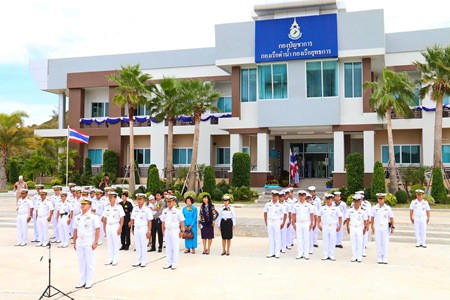With hopes of someday launching submarines again 64 years after its last ones were retired, the Royal Thai Navy honored the families of its first underwater crews on Submarine Memorial Day.
Vice Adm. Pijarn Teeranate, commander of the Navy Battle Squadron, chaired the ceremony at the Sattahip Naval Base Sept. 4, 78 years after Thailand took delivery of the first two of four subs from Japan, the only ones it would ever operate.
Relatives of the first Thai submariners attended the religious memorial service, including daughters, grandchildren and nephews, some of whom are in the Royal Thai Navy today.
 Vice Adm. Pijarn Teeranate, commander of the Navy Battle Squadron, leads officers and relatives of the first Thai submariners in a ceremony to celebrate Submarine Day in Thailand.
Vice Adm. Pijarn Teeranate, commander of the Navy Battle Squadron, leads officers and relatives of the first Thai submariners in a ceremony to celebrate Submarine Day in Thailand.
Built in the mid-1930s by Mitsubishi Heavy Industries for 820,000 baht each, the small Matchanu-class subs were 51 meters long, four meters wide and had a displacement of 375 tons. They only could dive to 60 meters and required a crew of five.
The subs went into service in 1938 and were used on reconnaissance missions during the undeclared 1940-41 Franco-Thai War. However, the submariners were unsuccessful in their only opportunity for warfare when they failed to stop a French raid and heavy Thai naval casualties at the Battle of Koh Chang in 1940.
The subs remained in service throughout World War II, but saw no action. Their only use came on April 14, 1945 – five months before Japan’s surrender – when Bangkok was bombed by the allies, knocking out the city’s power.
The Bangkok Electricity Authority called on the navy to bring its two subs to a Bangkok dockyard where they were used as generators to power a city train line.
Once Japan surrendered, the navy lost access to spare parts and Thai factories were unable to produce the powerful batteries required.
They were officially decommissioned following the failed 1951 coup against the military government of Plaek Pibunsongkhramknown, known as the Manhattan Rebellion, when the navy was stripped of its power and influence and the Submarine Group dissolved.
Today, the navy is again trying to acquire submarines, this time from China, but faces tremendous public resistance and is now engaged in a public-relations campaign to justify the need for subs.




